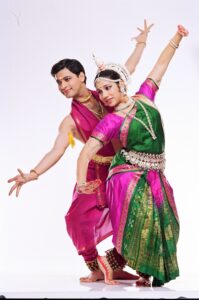We have often seen people who follow Hindu religion taking up various forms of Indian classical dance forms. Later, after years of training and learning, they perform various stories from the Indian mythology. It is rather unusual to find a person from a Christian background drawn to a dance form that is mostly practiced and performed by people of Hindu faith.
Today, I talk about a very special person who only follows the religion of dance – Raul Felix D’souza, a dynamic dancer who has been into Indian classical dance, Bharatanatyam, for over four decades and performs the character of Lord Krishna like no one else. It is even more unusual that he received his initial training from catholic priest Dr Francis Barboza and then advance learning from Guru Dr Deepak Mazumdar. To top it all, he is married to Mitali, an accomplished Odissi dancer, trained under the guidance of Guru Jhelum Paranjape, Padma Vibhushan Guru Kelucharan Mohapatra and Ratikant Mohapatra. The couple’s two lovely daughters too follow the footsteps of their parents. This, indeed, is a rare dancing family that India should be proud of.
When I caught up with Raul and Mitali and their daughters, Diya and Risa, all I saw was passion and love for the art of dance. Excerpts from an interview:

How did Bharatanatyam become a part of your life?
Raul I was a typical Christian boy, very fond of Jive, Cha Cha Cha and Waltz. Then one day, I met my Guru Dr Francis Bardoza, a priest at the church in Bandra I visited. Thereafter, my life totally changed. He introduced me to Bharatanatyam and soon I was performing with him in India and abroad. Switzerland was the first country I performed in and then we I travelled to Belgium, Holland, Portugal, Italy and Austria for shows. This drew me further into the world of dance. After Dr Bardoza left India, I joined Guru Dr Deepak Mazumdar and that is when my advance training happened in Bharatanatyam. What I learnt from Deepak sir was totally magical as he is a box of knowledge. It was only later, when I married Mitali, that we started to perform using two different dance forms, Bharatanatyam and Odissi.
How was it to break Christian mindsets of people around to learn a non-Christian dance?
Raul I personally never wanted to break or change any mindset. My only prayer was that when I dance, people get touched by it and do not think of it as a dance of a particular religion. When I’m on stage, I’m not a Catholic. One needs to be immersed in the character and enrich the audience from whatever background race, religion they come from or opinion they may have. When I perform Krishna with Hema Maliniji in her ballet, Radhakrishna, I play the character of Krishna, an artiste and not Raul, a Catholic or a Hindu.
How challenging is it to be together yet practice two different dance forms?
Mitali Dance is universal, a language of love and expressing our feelings and emotions. In these challenging times, it has given us an opportunity to share our experience and reach out in unique ways to audiences irrespective of age, religion, gender and culture; where all can come together.
Raul We initially thought it to be a challenge but Deepak sir pushed us and choreographed some interesting pieces for us. With time, it became an opportunity for us to reach out. Differences are manmade and the more we started performing together, we realised the beauty of how our styles complimented each other.
While setting up a choreography, what kind of differences do you both have?
Mitali The fact that we are male and female lead to a beautiful combination and we complement each other. We can depict Shiva Parvati, Radha Krishna and so many other jodis even as we maintain our own respective and distinct dance styles. My Odissi, a graceful dance with sculptural poses, torso movements and Raul’s Bharatanatyam with its straight geometrical lines blended the differences into a picture-perfect presentation. My guru Smt Jhelum Paranjape has been instrumental in guiding us through this journey along with Deepakji.
Raul The blend of music helped us to adapt to innovative item, which contained Hindustani, Carnatic and other temporary music. Sometimes our conflicting views may have been an obstacle in our presentation but this gives us an opportunity to be open, respectful and yet come together keeping our differences aside.
What dance forms are your daughters learning?
Mitali Diya (19) and Risa (15) have been learning under my guidance. Raul does not teach and I have my own dance school so they learn under me. Both the girls used to accompany us for all our shows and soon I started teaching them Odissi and they have continued to enjoy performing the dance form. I feel thrilled that they want to learn Odissi with me and wait to perform with Raul.
As a family of all dancers how you plan to bring the change?
Mitali For us, dance is a prayer, a sadhana, a spiritual experience. Dance consists of 3 Es – Educate, Entertain and Enlighten the audience. Our aim has always been to embrace each other’s differences and reach out to everyone. One of our dance pieces, Ekla Chalo communicates the message that one needs not be fearful and carve own path or English song, Cover the world with love.
Raul Mitali has been facilitating dance to all age groups. She has class for senior citizens, Graceful Legends, with her youngest student just 85. Inspiring Moms only has moms and then she has Enthusiastic Teens & her youngest batch, Odissi Champs’ with students as young as five.
D’souza family proves dance has no religion, no language. Dance belongs to those who surrender their lives to master the art and what flows out is excellence. With the blessing of their gurus when this dancing family steps on stage they are truly enchanting and mesmerising.